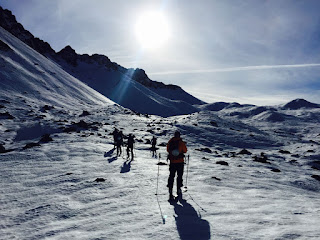 |
| Wonderful post-nights fall frolicking |
In the last few months, it has become increasingly apparent to me how many of my friends and peers are suffering from mental health problems. Of course, I am not here to 'out' them - but more to reflect on this silent wave of illness that simmers beneath the surface, just as much as any cancer, before it makes its presence known. Depression and anxiety in themselves affect a huge number of people - and yet they go completely unspoken as if they were an embarrassment or a failure. What is notable to me is that most people I know in this situation are, on the surface, absolute high flyers. They are the best of the best in what they do. They have never known professional failure. They are held in the highest regard by their peers. They are outwardly A Massive Success and yet they are not well at all, and see this as a failure.
I have sometimes struggled to know how best to support my friends as they make the journey to recovery. Perhaps that comes as a surprise to lay people that I, as a doctor, don't know what I'm doing when it comes to this aspect of health, particularly when it hits close to home. It's difficult to know you're doing or saying the right thing, that you're making yourself available enough both physically and emotionally, and that you're striking the right balance between simply listening and actively advising. It makes you question your ability to be not only a good friend but the right kind of friend. I'm still not sure I've nailed that balance. I've definitely found I've needed my own support network to offload the impact of these precious, complicated feelings that have been entrusted to me.
The conclusion I've come to is, much like grief, the most important thing is to look it in the face and acknowledge it. It's easy to focus on the 'good days' to avoid accepting the greater majority of 'bad days', particularly when 'bad days' are really, really bad - and being unable to 'function' on such days is a sign that it's time to find help. We are worth so much more than living in misery and struggle. And 'looking it in the face' goes for those of us supporting peers, friends and loved ones too. We mustn't shy away from it because we're scared that we'll react, listen and respond in the wrong way. Far better to engage imperfectly than not to engage at all.
 |
| An Austrian vista |
I am glad that the Royals (cheers, Wills, Kate and Harry) are making mental health an area for national discussion - it affects everyone and anyone, and respects nothing and no-one. There are those that might read this and think that to complain about high flyers with mental health problems is barely a problem worth talking about - but I would disagree. We're all people and this is a problem that will only worsen with time. Not talking about it feels like a far greater risk.
Our mental health is a precious and delicate thing, and I'm aware that I need to find my own ways of looking after mine. My dad is the one who taught me not to work too hard - to work 'quite' hard, and with commitment and passion, but not to lose sight of the balance of things. Having got that balance wrong quite often during my training, I hope that I'm establishing a sustainable work-life balance, and it's that sustainable element that made me quite comfortable to admit this 'don't work too hard' ethos over an academic dinner to my neighbour, who worked for a major research funder. And you know what? She welcomed it. And that makes me think that the Big Guys understand that this is a problem too.
Take care of yourself, and take care of those around you. Don't be afraid to ask the questions 'are you ok? Is there something else going on?' - asking these questions is unlikely to make things worse, and may just be the trigger that turns someone's life around.







